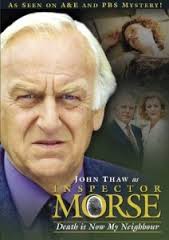
DEATH IS NOW MY NEIGHBOUR
UK, 1997, 100 minutes, Colour.
John Thaw, Kevin Whately, Mark Mc Gann, Judy Loe, Susan Field, James Grout, Clare Holman, Roger Allam, Holley Chant, Richard Briers, Susan Engel, John Shrapnel, Maggie Steed.
Directed by Charles Beeson.
Death is Now My Neighbour is the third last in the Inspector Morse series, and, in fact, the last of his regular investigations. As with so many of the series, the setting is Oxford, the colleges, with detailed look at the colleges themselves, the staffing, leadership and the competitiveness for leadership. There is also a look at the sordid behaviour of some of those involved.
Morse is not particularly well, is less well in the next film, The Wench Is Dead, where he solves a case from the past. And he dies at the end of the last film, The Remorseful Day.
This film has an interesting supporting cast including Mark Mc Gann as a journalist, Roger Allam is one of the contestants for the mastership, John Shrapnel is the other, with Richard Briers rather sinister as the master who is resigning, and Maggie Steed as John Shrapnel’s wife.
1. The popularity of the long-running series? Television movies? With style? The popularity of Morse and his personality, enigmatic and mannered style? The personality of Lewis? Their relationship? The solving of the crimes? Intricacy of the plot? The psychological dimensions, the mystery and clues? Police work and solving the mysteries with their own abilities? The work of Colin Dexter?
2. The Oxford settings, the city and landscapes, the cityscapes, the buildings? Comments about Oxford and Oxford society? The ironies about Oxford and the dons? The university city? Ordinary people? Their interconnections? So much beauty – and so much crime?
3. The quality of the mysteries, character-driven? Sufficient information, sufficient clues? The exploration of character and clues?
4. John Thaw as Morse, his personality, the changes over the years, yet remaining the same? The mystery of his name? His crusty manner, the bachelor (but romantic at times)? His own authority – exercised over Lewis – and his reaction to authorities? Promotion or not? The changing of his attitudes towards Lewis, bossing him, patronising him about education and culture? The issue of music? Drinking ale? His car? Quietly at home, at work? With Lewis, understanding the situations and characters, the deductions? His being a good listener – but critical?
5. The contrast with Lewis, the family man, the ordinary policeman, education and lack of education, his being put down by Morse – but enjoying his comeuppance now and again? Music and his ignorance? The first reactions, Lewis being patient? His admiration for Morse, having to do so much leg work, to formulate hypotheses? Working under pressure? Collaborator and partner of Morse?
6. The police authorities in Oxford? The medical examiners – and Morse and his attitude towards the female authorities? Sexist and patronising? Changing?
7. The quality of the film as a crime thriller, a thriller with intelligence and demands on the audience?
8. The introduction to the crime, the credits, the background in Oxford, beyond?
9. The range of personalities, motives? Truth and concealment? Jealousies? Deceits and angers? The academic and religious backgrounds? Emphasis on academic rivalries? Personal behaviour? Aspects of decadence? Jealousies?
10. Lonsdale College, the meetings, the master, his sinister attitudes, his behaviour with women, his blackmail, his dislike of Cornford? His wanting to get revenge because of Cornford’s behaviour with his wife?
11. The street, the killing, the identity victim and the complication with Storace, the journalist and his activity, the revelation of his blackmail, his death? His relationship with Adele? The interviews with Morse?
12. The issue with the addresses, Morse and Lewis, number 13, the mistaken address and killing – or not? The silhouette? 1a and the journalists house?
13. Morse and Lewis, the visits, the interviews, the research, Julien Storris, his affair, covering it? His marriage to Angela? Her past, her daughter, the death
of her husband, found not guilty? Her ambitions for her husband? The information about the conference, the hotel they stayed in, the meals, the visit to Angela’s daughter, the revelation of the alibi, the confrontation with Angela and her guilt?
14. Cornford, his reformation, America, marrying his young wife, his love for her? His past and the affairs? His wanting to be master, the competition with Storris? The meetings, the discussions, at home, the support of his wife? The visit by the Master and his sexual attack, his spurning of Cornford’s wife, her shame, her wanting her husband to succeed, her death?
15. Adele, her character, the alibi, discussions with Morse, his feelings for her, the revelation of his name? Love?
16. Superiors in Oxford, Chief Superintendent Strange, his attitudes towards Morse, towards the University?
17. Coming to the end of Morse’s career?